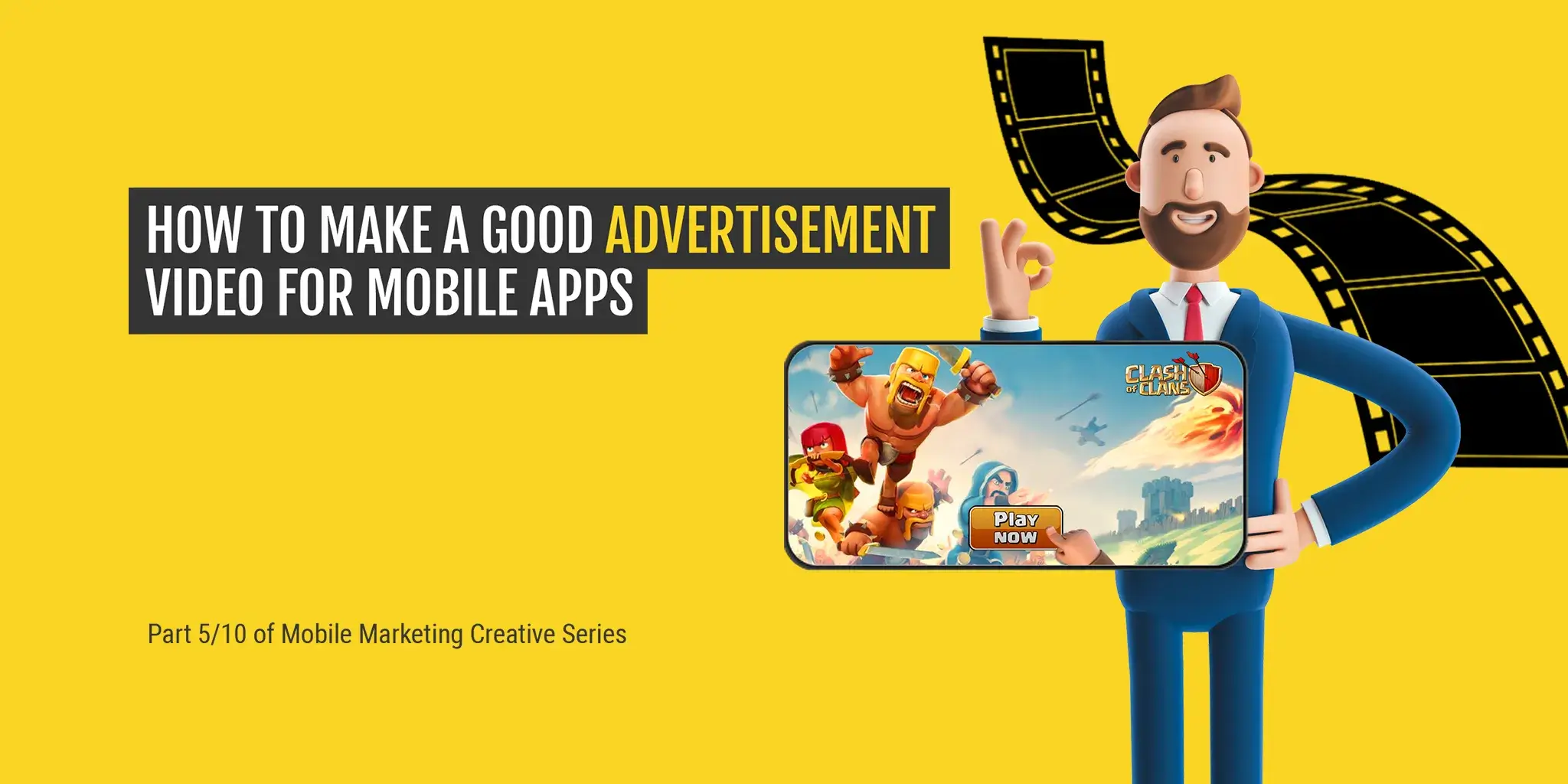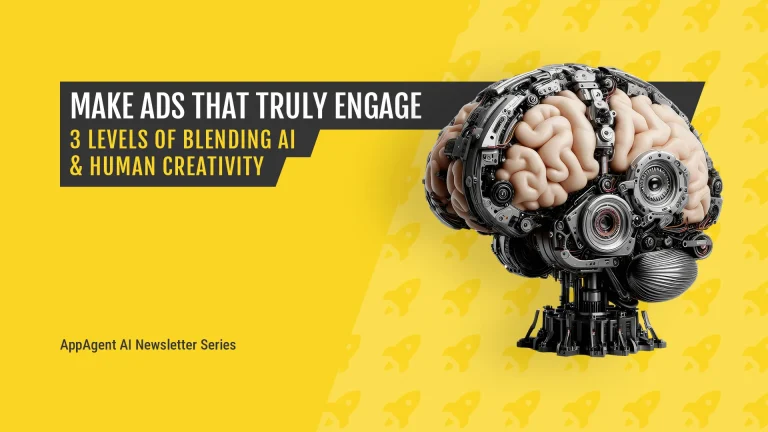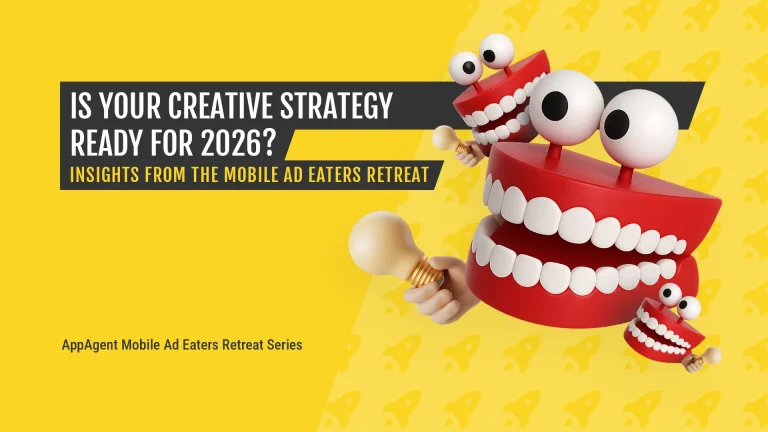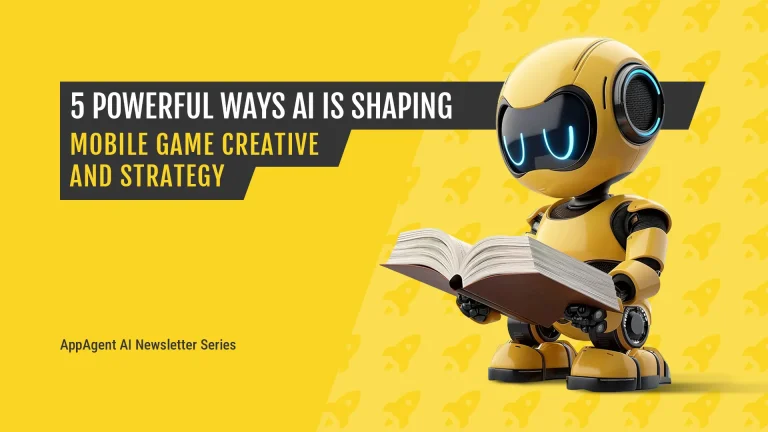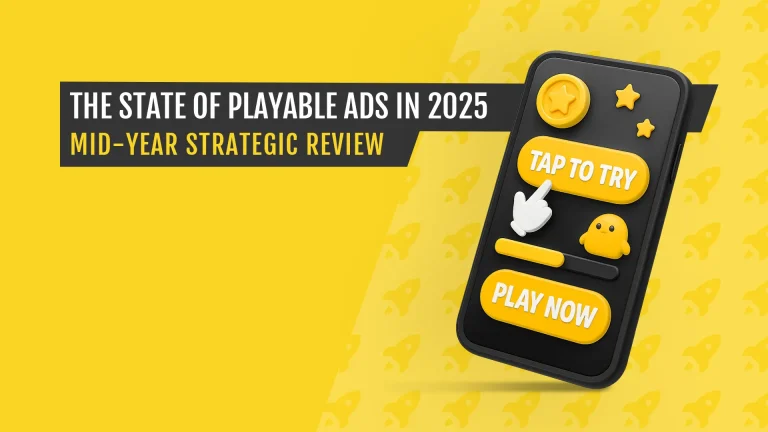Welcome to the fifth part of our Mobile Marketing Creative Series where we will show you how to make awesome mobile video ads. In ten episodes, we aim to provide insight and inspiration on creating thumb-stopping visuals to promote your app.

Download the Mobile Ad Creatives eBook today to read the other nine parts of this series. The comprehensive guide includes ten core topics condensed into a practical blueprint with examples from AppAgent’s Creative Team.
In this article, you will discover:
- How to adapt your mobile video ads to effectively deal with market saturation.
- The key distinctions between good and bad fake ads.
- 12 creative approaches to accelerate the ideation process.
- 13 mobile video ad examples to ignite your creative inspiration.
The Evolution of Ideation for Mobile Video Ads

Rational Mobile Video Ads
When launching a new mobile app or game, the element of novelty is often enough to start developing simple creatives. The goal at the very beginning is to quickly test different executions before investing more time and money in advanced ads.
For the first level of mobile video ads, you should feature gameplay or demonstrate the app in action.
Emotional Mobile Video Ads
As time passes, basic video ads tend to lose their effectiveness. When this happens, we advise our clients to elevate their approach by infusing emotions into their mobile video ads.
During the pre-production stage, it’s essential to identify the specific emotions that align with the motivational drivers.
There are numerous ways to incorporate emotions into mobile ad creatives, such as:
- Utilizing in-game characters
- Crafting surprising mini-stories
- Portraying conflicts or challenging situations
- Demonstrating the emotional impact and transformative effect of the app on users’ lives
- Featuring users and their authentic emotions
- Infusing humor and funny scenarios
- Striking an aspirational note, among other techniques.
By incorporating emotions, you can significantly enhance your ad success and create dozens or even hundreds of ads, breaking through creative barriers.
During this stage, video ad concepts that leverage 3D graphics, live footage, and those that diverge from the app or game experience are essential to captivate and attract new audiences who may have overlooked your previous ads.
For a practical example, take a look at the Design Home creative case study, which demonstrates the effective utilization of 2D, 3D, and live footage video ads:
If you’ve reached this point and are still facing challenges, it might be time to consider using fake ads.
Why Do Mobile Apps & Games Use Fake Mobile Video Ads?
Fake ads, commonly known as misleading ads, have been a source of success for game publishers like Playrix. However, many publishers fail to grasp the reasons behind this success.
Instead, they blindly mimic the form without understanding its essence. You’ve probably come across these types of video ads with flashy fails, pins, and fire all over the place – you know exactly what we’re referring to.
Though it has never been officially confirmed, Playrix likely employs an underlying logic related to motivators in developing these concepts. For instance, in Homescapes, the motivators identified are “Escapism – Thinking & Solving” and “Escapism – Excitement & Thrill,” as defined by GameRefinery.
If you look carefully at the Homescapes video ads and its store listing, you will see emotions in the rawest form. Each ad emphatically conveys the message, “[Think to] solve the [urgent or thrilling] problem [and escape from your boring life]!”
The essence of this puzzle game lies in problem-solving, and this is strongly portrayed in the ads.
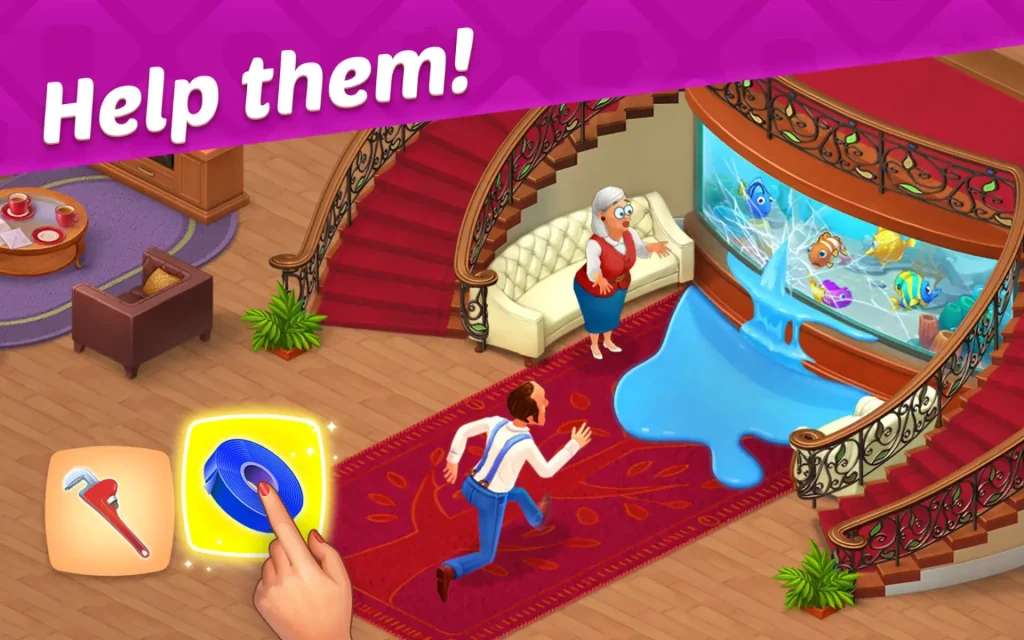
How To Create Successful Fake Ads
The key to successful fake ads lies in tapping into the emotional core that drives the app! By capturing the essence of the game experience and pushing visualization to the extreme, you can create compelling fake ads.
When the ad’s motivational driver aligns with the game’s essence, top-funnel metrics like Click-Through Rate (CTR) and Conversion Rate (CVR) will soar. Moreover, retention and monetization at the bottom funnel become crucially important.
On the contrary, if designers blindly copy others or experiment with crazy ideas lacking underlying logic, players will churn, and negative reviews will follow.
The Limitations of Fake Mobile Video Ads
It’s important to acknowledge that fake ads have their limitations in terms of audience appeal. For casual players who may not identify themselves as “mobile players,” this approach might be effective. They are less likely to be overly sensitive to any mismatch between the ad and the mobile game appearance.
However, for a mid-core RPG targeting serious gamers, fake ads become highly risky. In this scenario, the potential risks outweigh the benefits, and implementing a fake ad strategy should be avoided.
12 Creative Directions for Mobile Video Ads
At AppAgent, we’re continuously monitoring mobile ad creatives to understand what’s working and why. We’ve discovered that mobile ads can be categorized into one of 12 directions, all sharing a similar approach.
You can use these directions as an inspiration to help you quickly generate new ideas for your ads. Let’s look at these 12 directions more in detail.
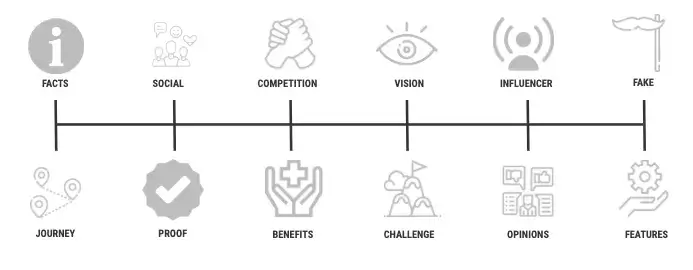
1. Facts
Highlighting facts like the percentage of people facing a particular problem or the time saved by using the product.
Example: Blinkist static ad using the copy “Mark Zuckerberg’s goal is to finish a book every 2 weeks.“
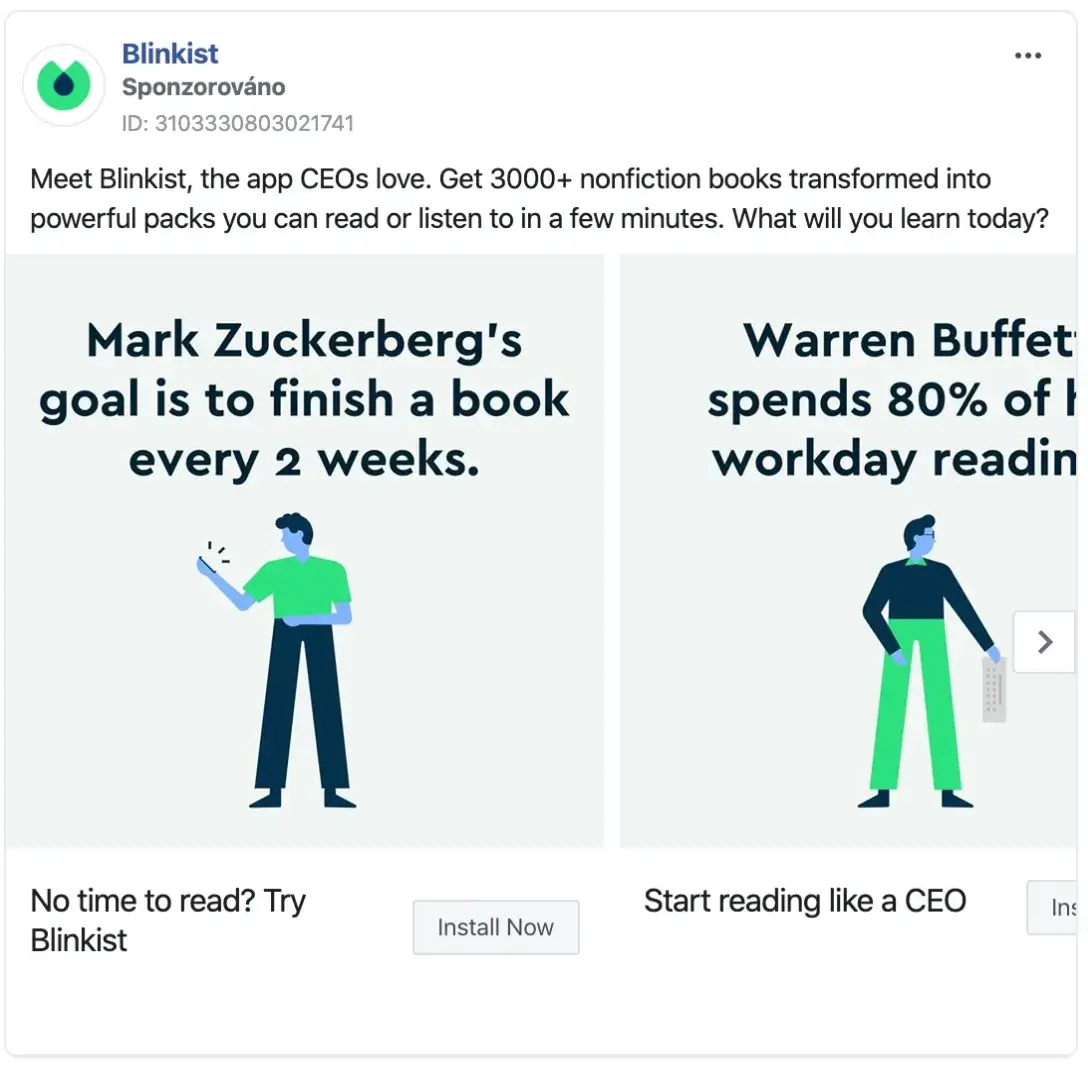
2. Social
Fostering collaboration, building a sense of community, and encouraging the sharing of creations.
Example: Clash of Clans “Stronger Together” mobile video ad.
3. Competition
Emphasizing player vs. player (PvP) competition, the pursuit of becoming the best, and achieving the highest scores or fastest times.
Example: Duel: Puzzle Wars “Fighters” mobile video ad.
4. Vision
Describing why the product was created, the founder’s vision, or a problem to be solved.
Example: Finimize “Max’s Story” mobile video ad.
5. Influencer
Using streamers, influencers, or celebrities to present your product.
Example: Raid Shadow Legends mobile video ad (Note: AppAgent did not produce this ad).
6. Fake
This creative direction ventures further from the actual product by either simplifying the narrative or using one that doesn’t exist in the game.
Example: Tasty Town “Dating Challenge” mobile video ad.
7. Journey
Taking viewers on a walkthrough of the product’s main features.
Example from the gaming industry: Monster Legends app preview video.
Example from the non-gaming industry: Pockethunt “Skip The Line” mobile video ad.
8. Proof
Using awards, famous quotes, customer ratings, or numbers to demonstrate time or money savings.
Example: Joom “Savings” mobile video ad.
9. Benefits
Focusing directly on benefits of the product or service, and how it can improve the user’s life.
Example: OneCast “Non-Stop Gaming” mobile video ad.
10. Challenge
A classic can you do better type of ad.
Example: Design Home “Challenge” mobile video ad.
11. Opinions
Primarily testimonials, but this direction could even involve a clash of two different perspectives or approaches (think of eToro ads).
Example: Design Home “Reviews” mobile video ad.
12. Features
Focusing on a specific product feature.
Example: Kiwi.com “Nomad” mobile video ad.
Final Thoughts
When advertising a new product, start by keeping things simple. Your video ads should focus on demonstrating the core functionality and main benefits of your mobile app or game.
Once you’ve explored this straightforward approach and achieved all you can, consider incorporating emotions to create more engaging ads that will attract new users.
If you decide to use fake ads, make sure they still stay true to the essence of your game, even if you simplify the story and visuals.
If you and your creative team find yourselves stuck, challenge yourselves to come up with concepts for your mobile video ads based on the 12 creative directions mentioned above. This will also help you systematically test which video ad styles work best for your product, allowing you to focus more on the most promising approaches.
REVIVING ROYALTY
A CLASH ROYALE ASO CASE STUDY
Discover how AppAgent elevated Clash Royale’s app store presence by incorporating captivating RPG-themed creatives.
